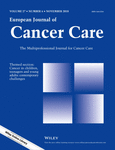“It’s not just about prostate cancer, it’s about being a gay man”: A qualitative study of gay men’s experiences of healthcare provision in the UK
Abstract
Following a diagnosis of prostate cancer, men require information and support from healthcare providers which is tailored to their individual needs. Studies reporting on the needs of gay men with prostate cancer, and their experiences of healthcare provision, are lacking. This study highlights the issues affecting this group of men and the implications for healthcare delivery in the United Kingdom. In-depth interviews were conducted with 12 gay men who had been diagnosed with prostate cancer. A phenomenological approach was used to collect and analyse data. Participants wanted, and expected, candid discussions with healthcare professionals, about how prostate cancer could affect their lives, sexual function, and how to access culturally relevant support before and after treatment. Participants perceived that their healthcare team had little knowledge about their needs, and if, or how, their experience differed due to their sexual orientation. Information provided was perceived as being misplaced or informed by heteronormative assumptions. Consideration should be given to requesting sexual orientation when recording patient information, if patients are willing to disclose. Training should be provided for healthcare professionals to enable them to provide information and support that is culturally relevant at all stages of the consultation.
CONFLICT OF INTEREST
The authors declare they have no conflict of interest.




